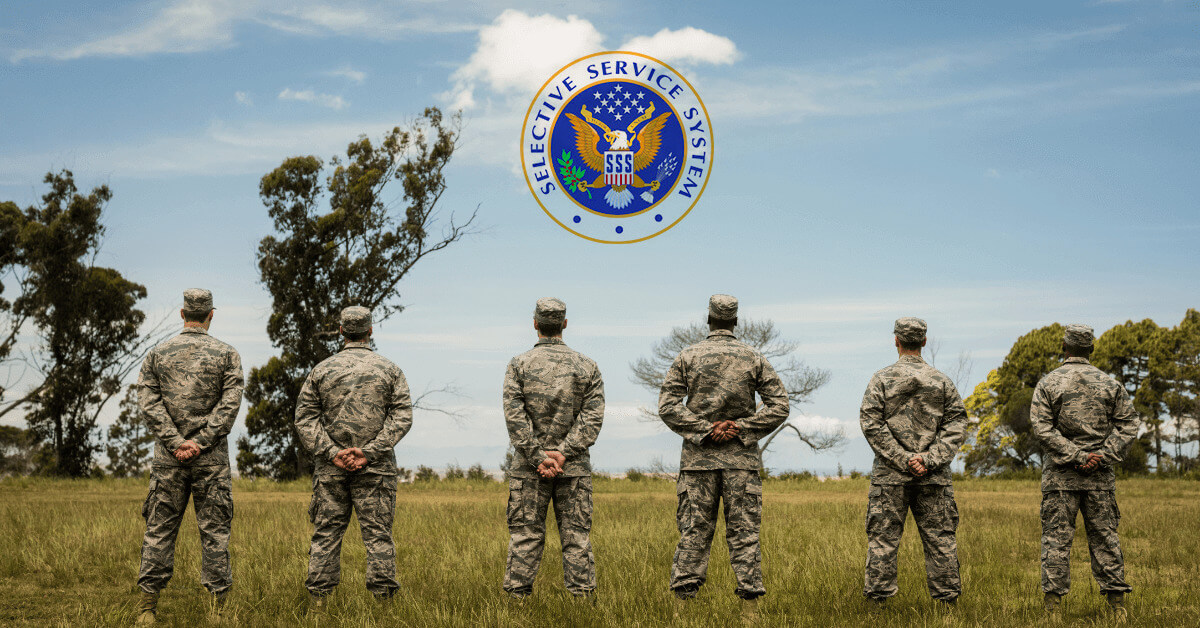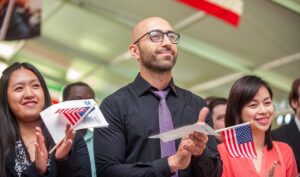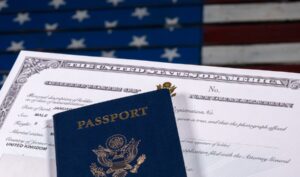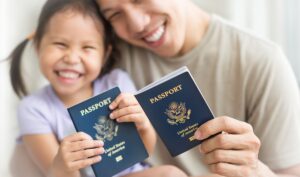
An applicant for U.S. citizenship through naturalization must show that he or she has been and continues to be a person attached to the principles of the Constitution of the United States. In other words, the applicant should actively support the Constitution with a strong degree of conviction. Afterall, the Constitution is cornerstone law that grants Americans certain freedoms. Therefore, failing to register for Selective Service can adversely affect the application's good moral character requirement for the naturalization process.
Although there is no military draft in the United States, men between the ages of 18 and 26 are expected to register for the Selective Service. Refusing or knowingly and willfully failing to register for Selective Service negates an applicant's disposition to the good order and happiness of the United States, attachment to the principles of the Constitution, good moral character, and willingness to bear arms on behalf of the United States.
Selective Service Requirements
The U.S. does not have a drafted military; the decision to join the military is entirely voluntary. The Selective Service maintains a list of names in case there is a national emergency requiring rapid expansion of the armed forces. Therefore, registering for the Selective Service System does not mean you are joining the military.
According to U.S. law, a man must register with Selective Service within 30 days of his 18th birthday. Selective Service can accept a late registration but not after a man has reached his 26th birthday. This requirement applies to citizens, permanent residents, refugees, asylees, and even undocumented immigrants. It does not apply to women or foreign nationals in the United States with nonimmigrant status (e.g. tourists, students, business, etc.). Visit their website for a detailed look at Who Must Register. In general, the following persons must register:
- U.S. citizens
- Permanent residents (green card holders)
- Refugees and asylees
- Undocumented immigrants (includes DACA beneficiaries)
- Only non-immigrant visa holders (international students, visitors, diplomats, etc.) do not need to register
Individuals may register for Selective Service at their local post office, return a Selective Service registration card received by mail, or online at the Selective Service System website. Confirmation of registration may be obtained by calling 1-847-688-6888 or going online to sss.gov.
Associate Director for Public & Intergovernmental Affairs
Why Registering is Important for All Men
As a resident of the United States, registering is a legal obligation. Failure to register as required is grounds for denying:
- An application for U.S. citizenship
- Federal student loans and grant programs
- Federal job training under the Workforce Investment Act
- Federal jobs or security clearance as a contractor
- Potential path to legal status through future legislation (such as DREAM Act or Comprehensive Immigration Reform)
Naturalization Obstacle Created by Failing to Register for Selective Service
As described above, the government can deny several federal benefits to someone who failed to register for Selective Service, including U.S. citizenship. Deliberately avoiding registration or even not knowing to register can create a significant problem for a male permanent resident that wants to naturalize as a U.S. citizen by filing Form N-400, Application for Naturalization.
Permanent resident men are commonly surprised when they stumble upon Question 44 in Part 12 of Form N-400.

According to Chapter 7 of the USCIS Policy Manual, “An applicant for naturalization must show that he or she has been and continues to be a person attached to the principles of the Constitution of the United States and well disposed to the good order and happiness of the United States during the statutorily prescribed period.”
Further, the manual makes it clear that "an applicant who refused to or knowingly and willfully failed to register for Selective Service negates his disposition to the good order and happiness of the United States, attachment to the principles of the Constitution, good moral character, and willingness to bear arms on behalf of the United States."
What Happens to Someone Who Failed to Register for Selective Service
For permanent resident men, failure to register for Selective Service becomes most problematic when it's time to apply for naturalization. As mentioned, it can be a barrier to obtaining U.S. citizenship. If you did not register as required, there different ways to approach the issue when filing Form N-400, Application for Naturalization.
Applicants Under the Age of 26
Applicants for U.S. citizenship under the age of 26 should expect USCIS to deny Form N-400 if they choose not to register for Selective Service. By making the decision not to register, the applicant is willfully failing to meet his obligation, and the USCIS officer will be forced to deny the N-400 application based on the applicant’s moral character.
Applicants that are least age 18 and under the age of 26, can take action now to correct the problem. They can easily register for Selective Service by visiting www.sss.gov. Not sure if you have registered? Applicants can even create an instant Official Letter of Verification to get proof. You can resolve the problem in just a few minutes.
Applicants Between 26 and 31 Years of Age
N-400 applicants between 26 and 31 years of age may be ineligible for U.S. citizenship. Again, applicants that “knowingly and willfully failed to register” or simply refused to register for Selective Service, should expect USCIS to deny Form N-400. On the other hand, USCIS will allow the applicant an opportunity to show that he did not knowingly or willfully fail to register, or that he was not required to do so.
Even if the reason for failing to register is innocent, many immigration attorneys suggest it is better to wait until age 31 (if applying based on five years of permanent residence) or 29 (if applying based on three years of permanent residence while married to a U.S. citizen). The reasoning is that the applicant must show five years (or three years respectively) of good moral character.
Applicants under the age of 31 that want to proceed with naturalization (rather than waiting) may do so. The applicant will need to present evidence that failing to register for Selective Service was an innocent oversight and that he did not “willfully” avoid the requirement. Applicants should submit the following three items with Form N-400:
- Status Information Letter from Selective Service
A Status Information Letter from the Selective Service states that you are over-age and therefore no longer required to register. USCIS will refuse to consider your situation without this letter. Request a Status Information Letter. - Sworn Declaration from Applicant
This signed statement explains why you did not avoid the Selective Service and why the failure was not willful. - Sworn Declaration from Supporter(s)
This signed statement is most effective if provided by people of authority such as a teacher or pastor. The letter should support your explanation of what happened to result in your not knowing you were supposed to register.
Many people have successfully naturalized by addressing the requisite good moral character in this manner. For the best results, always speak with an immigration attorney first.
- Status Information Letter from Selective Service
Applicants Age 31 and Over
Failure to register for Selective Service does not prevent a man who is at least 31 years of age from demonstrating that he is eligible for naturalization. This is because the applicant's failure to register would be outside of the statutory five-year period during which the applicant must show that he is of good moral character and disposed to the good order and happiness of the United States. (Note: The applicant must be at least 31 years of age on the day Form N-400 is mailed to USCIS to create the five years of permanent residence since turning 26.) In accordance with the USCIS Policy Manual, applicants for naturalization who are age 31 or older are eligible for naturalization even if they knowingly and willfully failed to register. Thus a man’s failure to register with Selective Service does not make him ineligible for naturalization because he is age 31 or older.
Generally, USCIS should not ask applicants who are age 31 or older to provide a status information letter. However, if asked for such a letter, the applicant may submit this formal letter from the SSS to address the situation.
RECOMMENDED: 4 Things to Do After Becoming a U.S. Citizen
Seeking Legal Advice After Failing to Register for Selective Service
Failing to register for Selective Service can be grounds for USCIS to deny Form N-400, Application for Naturalization. Many immigration attorneys will recommend that their clients wait until age 31 to apply to ensure five years of good moral character.
Applicants between 26 and 31 years of age should contact an immigration attorney before filing Form N-400, Application for Naturalization. Although the applicant may prepare sworn declarations on his own, the guidance from an experienced attorney will generally produce the best results for your situation.
RECOMMENDED: 5 Common Reasons Form N-400 Gets Denied
About CitizenPath
CitizenPath provides simple, affordable, step-by-step guidance through USCIS immigration applications. Individuals, attorneys and non-profits use the service on desktop or mobile device to prepare immigration forms accurately, avoiding costly delays. CitizenPath allows users to try the service for free and provides a 100% money-back guarantee that USCIS will approve the application or petition. We provide support for the Naturalization Application (Form N-400), Green Card Renewal Application (Form I-90), and several other immigration services.
Want more immigration tips and how-to information for your family?
Sign up for CitizenPath’s FREE immigration newsletter and
SAVE 10%
on our immigration services



